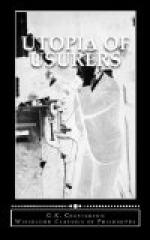Any man can be praised—and rightly praised. If he only stands on two legs he does something a cow cannot do. If a rich man can manage to stand on two legs for a reasonable time, it is called self-control. If he has only one leg, it is called (with some truth) self-sacrifice. I could say something nice (and true) about every man I have ever met. Therefore, I do not doubt I could find something nice about Lyons or Selfridge if I searched for it. But I shall not. The nearest postman or cab-man will provide me with just the same brain of steel and heart of gold as these unlucky lucky men. But I do resent the whole age of patronage being revived under such absurd patrons; and all poets becoming court poets, under kings that have taken no oath, nor led us into any battle.
III. Unbusinesslike Business
The fairy tales we were all taught did not, like the history we were all taught, consist entirely of lies. Parts of the tale of “Puss in Boots” or “Jack and the Beanstalk” may strike the realistic eye as a little unlikely and out of the common way, so to speak; but they contain some very solid and very practical truths. For instance, it may be noted that both in “Puss in Boots” and “Jack and the Beanstalk” if I remember aright, the ogre was not only an ogre but also a magician. And it will generally be found that in all such popular narratives, the king, if he is a wicked king, is generally also a wizard. Now there is a very vital human truth enshrined in this. Bad government, like good government, is a spiritual thing. Even the tyrant never rules by force alone; but mostly by fairy tales. And so it is with the modern tyrant, the great employer. The sight of a millionaire is seldom, in the ordinary sense, an enchanting sight: nevertheless, he is in his way an enchanter. As they say in the gushing articles about him in the magazines, he is a fascinating personality. So is a snake. At least he is fascinating to rabbits; and so is the millionaire to the rabbit-witted sort of people that ladies and gentlemen have allowed themselves to become. He does, in a manner, cast a spell, such as that which imprisoned princes and princesses under the shapes of falcons or stags. He has truly turned men into sheep, as Circe turned them into swine.




